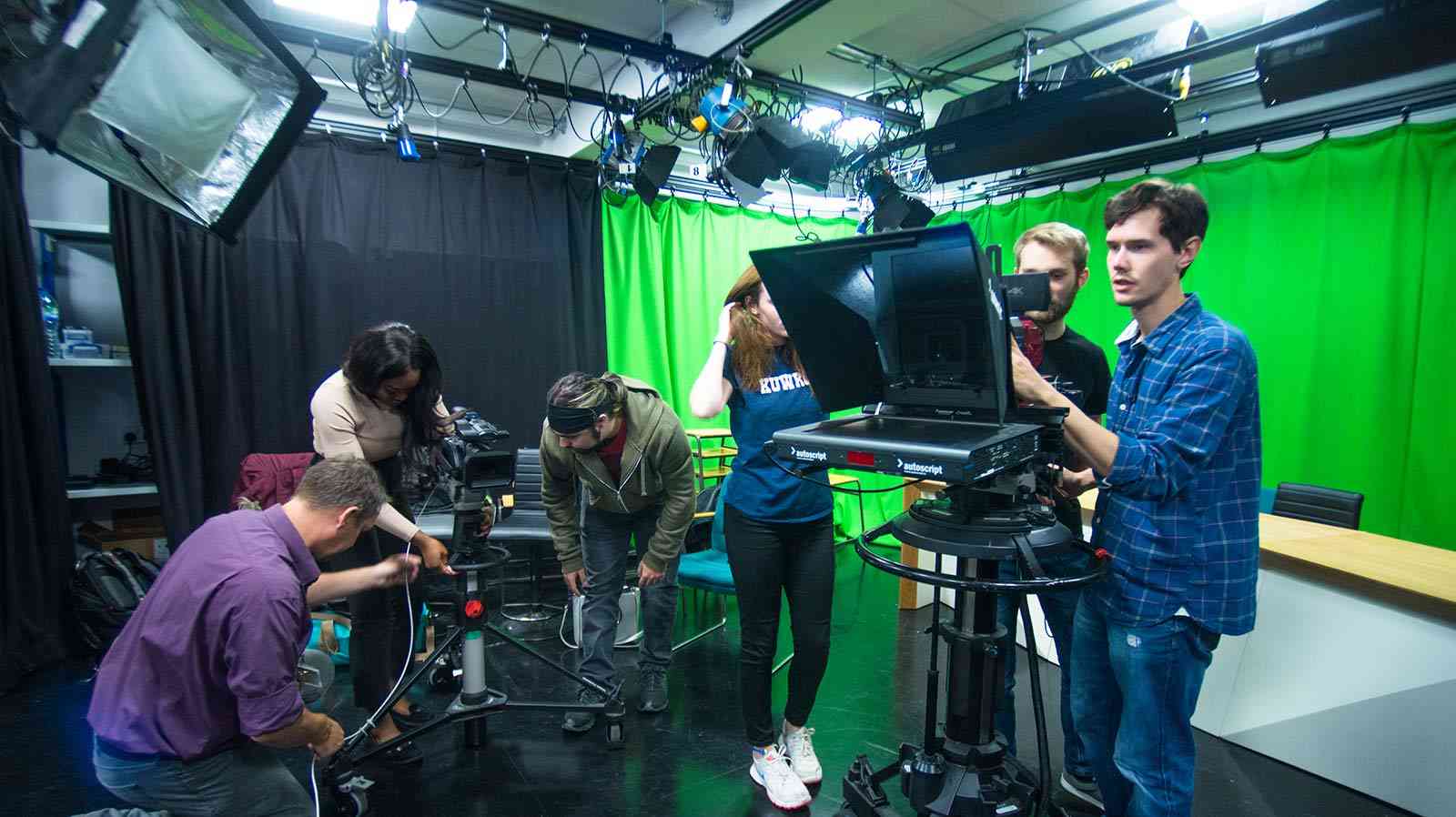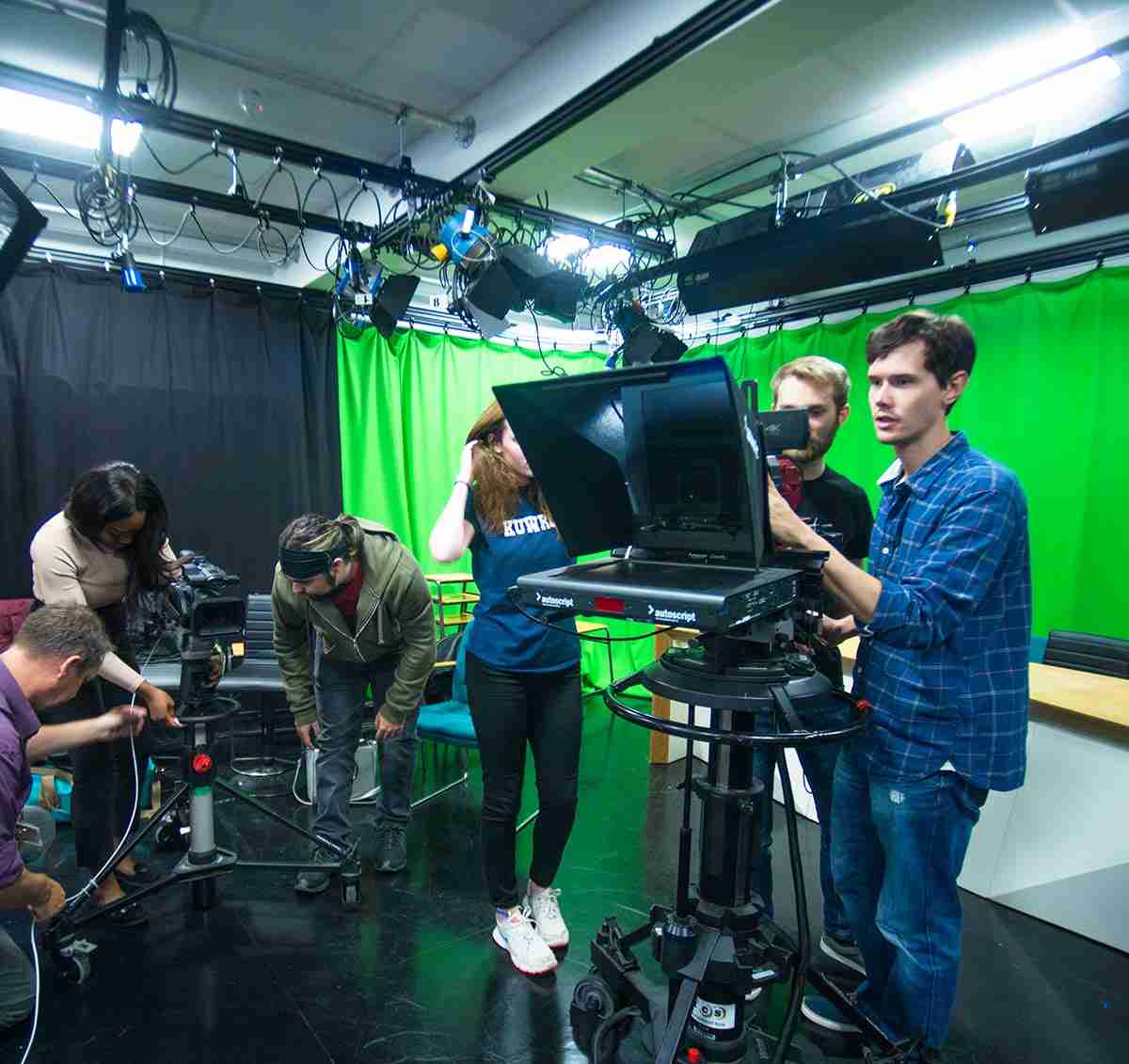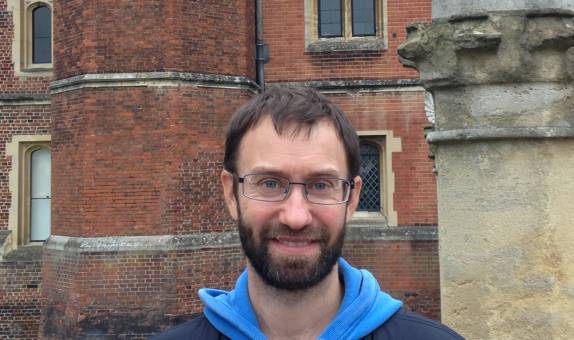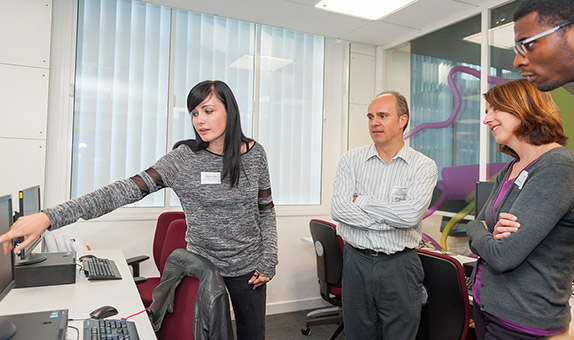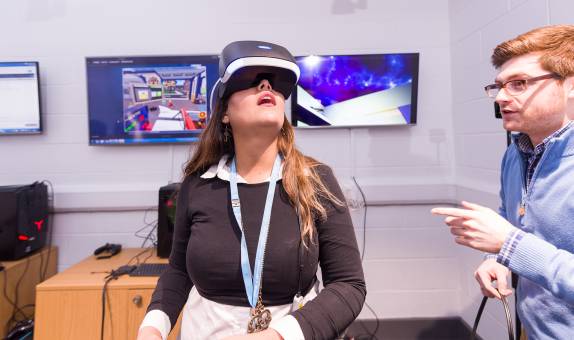Digital Media Technology BSc (Hons)

Teaching Excellence Framework (TEF) Gold award
Our commitment to high quality teaching has been recognised with a TEF Gold rating. The University has received an overall rating of Gold, as well as securing a Gold award in the framework's two new student experience and student outcomes categories.
Why choose this course?
Digital media defines our times and helps shape our lives. This course will help prepare you for a career in this exciting, ever-changing sector.
You'll gain an understanding of the fundamentals of media, 2D and 3D computer graphics, programming, motion graphics, UX design, visual effects and emerging technologies such as AI.
You'll create sophisticated media-based products, such as animations, moving graphics, compositing, 3D modelling, texturing, lighting, interactive web content and filming. Through option modules, you'll be able to pursue your chosen specialism.
| Attendance | UCAS code/apply | Year of entry |
|---|---|---|
| 3 years full time | G450 | 2024 (Clearing) 2025 |
| 4 years full time including sandwich year | G454 | 2024 (Clearing) 2025 |
| 4 years full time including foundation year | G455 | 2024 (Clearing) 2025 |
Please note: Teaching on this course may take place on more than one KU campus.
| Main Location | Penrhyn Road |
Reasons to choose Kingston University
- We have extensive media and games labs and studios where you can work on MFX, VFX as well as VR and AR projects in the Centre for Augmented and Virtual Environments (CAVE).
- You'll build a strong portfolio to showcase your work to employers in the industry.
- There are opportunities for industry visits in central London, home to many digital media and top creative companies.
- Kingston University is ranked No.2 in London for Animation and Game Design (The Guardian University Guide 2024).
Digital Media Technology at Kingston University
What you will study
Year 1
Year 2
Optional sandwich year
Year 3
Core modules
Introduction to Digital Media
30 credits
On this module you will learn two core aspects of contemporary digital media: one, the software applications that manipulate still and moving imagery as well as audio production using industry standard apps such as the Adobe Suite. Two, how to use professional lights, cameras, audio and editing software to create high quality photos and videos. In addition to the technical skills, you'll also learn the creative process of digital media production, such as generating ideas, develop storyboards, and execute your vision.
Computer Generated Imagery
30 credits
This module introduces students to professional 3D Computer Graphics and Animation. You will learn how to construct 3D geometric models, apply shaders using assorted textures, illuminate them and render these to create high quality images. You will also acquire underlying knowledge to make efficient use of topology for generating 'clean modelling'. At the end of the module, you will produce a portfolio of 3D CGI assets. The module also introduces the fundamental scientific concepts underpinning digitally generated imagery and animation.
Professional Environments 1
30 credits
The goal of the Professional Environments module is to prepare students for professional practice. It will firstly ensure they acquire suitable employability assets and secondly equip them with an understanding of the role of a professional in society and the role of professional bodies.
While the bulk of the taught programme focuses primarily on domain knowledge, the Professional Environments module focuses on developing key skills, personal qualities (e.g. commercial awareness, reliability and punctuality, understanding the centrality of customers and clients), and professional knowledge including the need to engage with continuing professional development. With such assets, students will generate a CV, an employment portfolio, and a professional online presence.
Being a professional also means understanding the key legal, ethical and societal issues pertinent to the domain, and understanding the need for continuing professional development (CPD) especially when technology develops at such a rapid pace. The module is designed to support different domain areas and to integrate experience from other professions. The subject areas being studied demand a global perspective which encourages the inclusion of our diverse of communities and national practices.
Reflecting the fact that team working is ubiquitous in the modern workplace, a significant proportion of the assessment work on the course is based around group work. There is considerable evidence that group work promotes a much deeper engagement with taught content and the Future Skills report shows how it is embedded in working practices. It also encourages the development of diverse learning communities with computer science, cybersecurity and digital media students working in close proximity. This module will therefore introduce students to best practice in group working covering how to approach group work, how to understand yourself, how to deal with different types of people, and methods of selecting and managing groups.
Programming I: Thinking Like a Programmer
30 credits
We designed this module to establish a foundation for key Programming Concepts. We do not assume prior experience of programming, as we know you will all have widely different levels of existing knowledge. The module is designed to be accessible to a beginner while still being exciting for an experienced coder.
We are excited to be able to deliver this module using Kingston's own home-grown learning environment for programming, NoobLab. NoobLab gamifies your learning, making programming enjoyable and accessible for all existing ability levels – no other university offers this platform or unique approach to learning:
You will learn a variety of programming languages. In the first few weeks, we will use visual blocks that will allow you to construct programs and focus on thinking like a programmer rather than getting bogged down in grammar and syntax. Then, with these skills established, you will learn Python, Javascript and optionally Java, solving "Code Kata" style programming challenges on a weekly basis. This will equip you to build a graphical card game as your capstone project for the module.
Core modules
Digital Motion Graphics and Compositing
30 credits
This module builds on the foundations of the Level 4 modules, in particular CI4001 and develops knowledge and skills in creating and manipulating motion graphics assets, managing the editing process and compositing multi layered as well as multi nodal visual effects. This includes still images, video, audio, paint, and video based animation and effects.
These skills are further developed to a high level of appreciation, in particular for the flow of work for digital editing and contemporary composting in 2D and 3D spaces. You will acquire knowledge, develop skills and synthesis media products for self and tutor assessment. Professional level motion graphics, editing and compositing software will be employed. Furthermore studio based green/blue screen filming will be undertaken to create original material for visual effects project work.
Multimedia Authoring and Design
30 credits
The primary aim of this module is to develop a range of skills in the creation of multimedia products, through the study and production of sophisticated content driven interactive material using industry standard multimedia authoring software. You will also be taught to write computer code (script) to a high level using a scripting language in order to generate interactive content, animation, navigation and data storage/retrieval.
Professional Environments 2
30 credits
This module is designed to encourage you to look outwards to industry and employability, and make you more confident when facing the job market upon graduation. You will develop excellent group working skills, broaden your understanding of industry and its requirements, and enhance your project management skills.
It is always exciting to watch the groups collaborating as they produce their entrepreneurial projects for Kingston University's "Bright Ideas" scheme; students involved in this have won awards, producing fascinating artefacts for their remaining term and exploring new and different areas within their course field.
The module is an opportunity to work with many different students, working in subject areas that are innovative and unusual. Very often, a student may discover something they did not know that they could achieve. This triggers new learning and an added confidence that was not previously there. Those are the times that the learning is strongest, and our pride in the student, the greatest.
Optional modules
Modelling and Animation
30 credits
Students taking this module will have already developed proficiency in the use of a professional 3D Modelling and Animation software application, and so will understand the principles of modelling, lighting, texturing and rendering. This module will enable them to strengthen these skills and build a portfolio of 3D computer assets and 3D animation. They will acquire additional skills such as the use of 3D sculpting software, rendering using techniques such as global illumination and image-based lighting with a high understanding and skill. Students will be able to show their modelled work as a turntable animation using different rendering techniques.
The principles of animation are introduced and students will learn how to apply these principles to 3D computer animation. This is a practical module where the majority of a student's time is spent working at a computer. Similarly, assessment is practically based with multiple choice tests to show they understand both basic and advanced theoretical techniques. Taught in common with CI5003 and cannot be taken if CI5003 has already been taken.
User Centred Design
30 credits
This is an optional module intended for undergraduate students who are studying computing-related subjects. HCI is the core academic discipline that examines the relationship and interface between human and computer. It informs and provides the theoretical and methodological foundation for user experience, the professional discipline which is practically applied. Although this module forms part of the user experience guided pathway it can be taken as a standalone module.
You will explore major themes in HCI from both a theoretical and a practical perspective. The module will establish an understanding of key concepts within HCI theory and methods, and examines techniques for HCI design and evaluation. It offers students a practical domain in which to apply knowledge and skills, including those gained from other modules, to the design, implementation and analysis of interfaces between people and computer systems. You will undertake practical exercises in which you will evaluate real-world problems to identify user experience issues. You will utilise the synthesis of data from methods which explore user needs and requirements and also users' cognitive models to build a suite of artefacts e.g. personas, user journeys, empathy maps etc which will inform a prototyping phase. This process involves iteratively building on low, medium and high-fidelity prototypes of increasing complexity and levels of iteration. Thus you will synthesise theory and empirical data to build prototypes of a redesign solution to usability issues. These artefacts will iteratively and incrementally inform a user centred design.
Core modules
Industrial Placement
60 credits
This module is an essential course programme component for students on the sandwich route of an honours degree "with professional placement". It is a key element in providing an extended period in industry gaining real world employability skills. Students are supported both before and through their placement by the Placement Team. Students that successfully complete their placement year will graduate with a four-year sandwich degree.
Core modules
Visual Effects
30 credits
You will learn to build on your skills and knowledge to make detailed and exciting visual effects. Through interpreting client and student generated briefs you will design VFX pipeline for pre-production, production and post-production. You will also implement this through your chosen combination of 2D, 3D CGI, animation, film/video, audio and compositing tools and techniques to produce group-based work you can show to potential employers. The module also reviews the professional working practices of the film, television, visual effects, post-production and computer graphics industries and the various roles students can expect to undertake upon graduation.
Individual Project
30 credits
The Individual Project is an opportunity for you to demonstrate your skills in project management, research, analysis, critical thinking, technical skills and creativity, in relation to contemporary Media Technology.
There are a range of genres to choose from: film, motion graphics, CGI, interactive…etc. So, the Individual Project offers an ideal chance to specialize and develop in-depth knowledge and experience of a particular genre that excites you, building on your previous years of learning on the various core modules on our Media course.
The Individual Project is the capstone of your degree. Therefore, a good project will showcase your ability and aptitude for a chosen sector of the Media industry. It should form a significant part of your portfolio to impress future employers.
Optional modules
Game and Media Creation Processes
30 credits
In this module you will create computer games using industry-standard production and management techniques to a professional standard. Programmers and media students work together using agile team-working to collaboratively design, develop and test games with the potential to be published on app stores and game distribution platforms such as itch.io. The games will be developed using commercial game engines such as Unity and Unreal, with the artists using tools such as Maya and Photoshop.
As part of the module, industry speakers will provide unique insights into current practices and net-working opportunities and also advise on portfolio building to support your future games career.
User Experience Design Thinking
30 credits
This is an optional module intended for undergraduate students who are studying Computing-related subjects. Although it forms part of the User Experience guided pathway it can be taken as a standalone module and previous experience of UX is not assumed. This module will focus upon the skills, methods and tools required in careers such as UX Architect, UX Designer, Service Designer, Information Architect or Digital Product Designer. The curriculum is finely balanced between theory and practice. Students are directly immersed in organisational practices and skills used in industry and will make use of academic theory in this practical context. Students will learn to develop investigative, analytical, technical, communication and advocacy skills to help them shape interactive technologies that augment people's abilities, enhance their creativity, connect them to others and protect their interests. They will also become aware of the impact of levels of digital literacy, availability of and access to technology, economic and business drivers, regulations, and regional/cultural norms. The module will also develop methods and skills required to understand current users, to investigate non-use, and to imagine future users.
Digital Entrepreneurship
30 credits
Entrepreneurship is a major driving force in creating economic growth and this module illustrates how to work in an entrepreneurial fashion. At the heart of entrepreneurship is innovation, which can come in many forms. Sometimes this can be an incremental but generally gives significant improvement to the customer. Alternatively it is a new breakthrough or transformational innovation. Incremental innovation is aimed at increasing the value of a product or service, to add more value and thereby creating new and superior value chains. Breakthrough innovation often creates new categories of product, or transforms the historical ways of doing things.
From this foundation, the module proceeds to explain how to develop a strategy, not only to satisfy the critical needs that organisations have, but also to explore the application and use of improved value chains using the concepts of corporate venturing (spin-out/intrapreneurship) and entrepreneurship (new venture creation).
However it is not simple to start a new company. Especially the tech branch is characterised by fast developments, shifts of focus and low barriers to entry, where holding back from "bleeding edge" is essential and is one of the important differentiating factors between Tech Entrepreneurship and other forms of entrepreneurship. This means that one can no longer count on "good luck", and insight, understanding, knowledge and a systematic approach all have to be learnt.
This module will convey the concepts needed for roles in analysis, consultancy and management in technology environments, plus the necessary knowledge to work successfully in an innovative company, as well as providing a good background for new venture creation (Entrepreneurship) for those considering self-employment or founding new technology firms
Please note
Optional modules only run if there is enough demand. If we have an insufficient number of students interested in an optional module, that module will not be offered for this course.
Future Skills
Knowledge to give you the edge
Embedded within every course curriculum and throughout the whole Kingston experience, Future Skills will play a role in shaping you to become a future-proof graduate, providing you with the skills most valued by employers such as problem-solving, digital competency, and adaptability.
As you progress through your degree, you'll learn to navigate, explore and apply these graduate skills, learning to demonstrate and articulate to employers how future skills give you the edge.
At Kingston University, we're not just keeping up with change, we're creating it.

Entry requirements
If you would like to join us through Clearing 2024, please call our Clearing line on 0800 0483 334 (or +44 020 8328 1149 if you are calling from outside the UK) and speak to our friendly and knowledgeable hotliners who will be able to provide information on available courses and will guide you through your options.
Please note the entry requirements listed below are for 2025 entry only.
Teaching and assessment
Scheduled learning and teaching on this course includes timetabled activities including lectures, seminars and small group tutorials.
It may also include placements, project work, workshops, workshops in computer labs, and laboratory workshops.
Staff teaching on this course
The course is taught at the School of Computer Science and Mathematics.
The School of Computer Science and Mathematics is driven by the philosophy of 'learning through making'; we focus strongly on facilitating a hands-on experience, student led and owned product portfolios and producing industry-ready graduates.
We utilise a range of innovating teaching and learning approaches in our invigorated and modernised degree programmes; combining studio practices, project-based learning, and context driven lectures to facilitate an informed approach to problem solving.
Postgraduate students may run or assist in lab sessions and may also contribute to the teaching of seminars under the supervision of the module leader.
Facilities
- Access to the media lab and film studio for blue screen VFX filming or TV programme production.
- Access to the newly launched CAVE (Centre for Augmented and Virtual Environments) featuring HTC Vive, Oculus Rift and Sony PlayStation VR headsets.
- Access to our games lab including Sony PlayStation 4 consoles. Software tools including Unreal, Unity Pro and Visual Studio.
Course fees and funding
Additional costs
Depending on the programme of study, there may be extra costs that are not covered by tuition fees which students will need to consider when planning their studies. Tuition fees cover the cost of your teaching, assessment and operating University facilities such as the library, access to shared IT equipment and other support services. Accommodation and living costs are not included in our fees.
Where a course has additional expenses, we make every effort to highlight them. These may include optional field trips, materials (e.g. art, design, engineering), security checks such as DBS, uniforms, specialist clothing or professional memberships.
After you graduate
Your knowledge and skills will be in demand in the media and games industries and relevant to a wide range of computing careers. Students have worked for organisations such as the BBC, Framestore and Double Negative.
Examples of recent graduates' destinations:
- Multimedia designer e.g. Game of Thrones
- VFX artist: Compositor or 3D artist e.g. Avatar
- TV: Digital editor or motion graphics artist e.g. BBC
What our graduates say
James Francis describes why he chose to study digital media technology at Kingston University and how it prepared him with the knowledge and skills to work in the motion graphics industry creating TV adverts.
Student projects
Luke Dadley
Luke applied late in the summer and was unsure what area of media he wanted to pursue, however, following a short introduction and a tour of the facilities he decided digital media was right for him. He graduated in summer 2018 with first class honours topped with a double prize for achievement and best project.
Helium: Team Project
Final Year Team project comprised of James Bates, Jasmin Davies and Euan Muldoon. They brainstormed their own concept, and followed the classic stages of pre-production, production and post-production for their final year VFX module. After much enjoyable experimentation, the group found their stride to render there romantic/tragic narrative as expressed through their imaginative use of Adobe Creative Suite, Maya, Nuke...and host of other contemporary technologies. The breakdown illustrates the process of constructing their work.
Ben Chellaram
Ben had immense curiosity and passion for digital design. So, while exploring his possible future career through series of assignments in the second year, he realized Motion Graphics was what was really fascinated him the most. The video shows a keen eye for animation and effects, even for a short 15-second After Effects project. He found employment straight after graduation.
Antczak: CG Watch
Made by Patrick Antczak as part of his final year project, using 3D Maya, demonstrating excellent modelling, texturing, lighting and animation skills. As a mature student he felt dissatisfied working in customer services, and decided his career lay in the creative industries, but did not know which path to peruse. Following a series of modules based on video production, 2D animation and audio production, he found his feet with computer graphics.
Phyo: Mythical Landscape
Pyae Phyo turned to his home country of Burma for his inspiration. His growing interest in motion graphics (After Effects) and compositing (Nuke) helped him to research visual effects extensively, before finding actors for filming, using our green screen studios and creating a magical world through CGI (Maya). He edited all these to tell his ancient tale of mythical lands he remembered as a boy through the new digital technology.
Monika: Behind the Curtain
Monika Jastrzebska's passion for film, documentary and contemporary life brought her to the world of the theatre. In her exploration of visual story telling she discovered how the modules through the first and second years of her study could be brought together to make this visually compelling story of how the theatre can empower people.
How we work with industry partners
A diverse team of professionals teaches this course, bringing a wealth of experience. This means that:
- our teaching is illustrated by personal experience
- you have access to practical help from someone with up-to-date knowledge
- the calibre of our teaching is known to a wide pool of employers.
Work-based learning
You develop your skills by undertaking a number of projects that are based on workplace scenarios. These help you:
- learn how to apply your academic studies to real-life situations
- prepare for the job market
- ascertain the career direction that interests you most.
Events and lectures
Embedded within the academic year are two Enrichment Activity Weeks. The first is in week 6 of Teaching Block 1 and the second in week 12 of Teaching Block 2, which includes Careers and Employability events.
These provide students with the opportunity to explore their CV and interview skills and look forward and plan for both industrial placement and employment after university.
Our award-winning careers service offers a range of events, which includes: employers on campus to promote internship, placement and graduate opportunities; profiling specific roles within industry; and exposing students to employers and building skills and knowledge.
The current set of events includes part-time jobs fair, guest lectures, the Big Kingston Careers Fair, Enrichment Week activity, Creative Conference, work abroad fair.
In addition, a range of software development competitions and hackathon type events are organised by the staff and various societies.
How you can work in industry during your course
This course is offered in both sandwich and non-sandwich modes. Work placements are actively encouraged as they expose students to a real working environment, which makes them more experienced and employable after their first degree. Work placements also enable employers to find employees for permanent positions.
The University's career service, has a specific team for the faculty that helps source industrial placements. Placement specialists within the team help students throughout the application process, with support interviews and throughout the transition to work. There are mock interview sessions, CV workshops, careers fairs and industry speakers on employers' needs. The team monitors the student whilst in industry. Placement students are visited whilst in industry by a network of academics who act as individual placement tutors.
Work placement year
Examples of placements
Placements can be with large multinational companies, international companies, local companies and small start ups; offering a diverse range of posts. Here are some examples of employers and roles:
| Construction-based placement employers | Construction-based placement roles |
|---|---|
| RG Group Multiplex Costain Willmott Dixon Fluor |
Assistant site manager Assistant trades package manager Assistant logistics manager Health and safety officer Construction engineer |
| Science-based placement employers | Science-based placement roles |
| Reckitt and Benckiser GSK Drug Control Centre Minton Treharne and Davies Ltd Various local and international hospitals |
Bioanalytical sciences Lab assistant Pharmacy assistant Sports coach |
| Engineering-based placement employers | Engineering-based placement roles |
| Airbus BAM Nuttall Nissan Bosch Wozair |
Analysis of aircraft structure Construction resources specialist Site engineer assistant |
| Computing and IS-based placement employers | Computing and IS-based placement roles |
| Disney Sony Interactive Entertainment Europe IBM McKinsey Intel |
Database co-ordinator Software developer Website developer App developer |
| Mathematics-based placement employers | Mathematics-based placement roles |
| Lloyds Banking Group AXA Allianz PAU Education, Spain |
Analyst Investment solutions Research analyst Accounts assistant |
Key information set
The scrolling banner(s) below display some key factual data about this course (including different course combinations or delivery modes of this course where relevant).
Course changes and regulations
The information on this page reflects the currently intended course structure and module details. To improve your student experience and the quality of your degree, we may review and change the material information of this course. Course changes explained.
Programme Specifications for the course are published ahead of each academic year.
Regulations governing this course can be found on our website.

